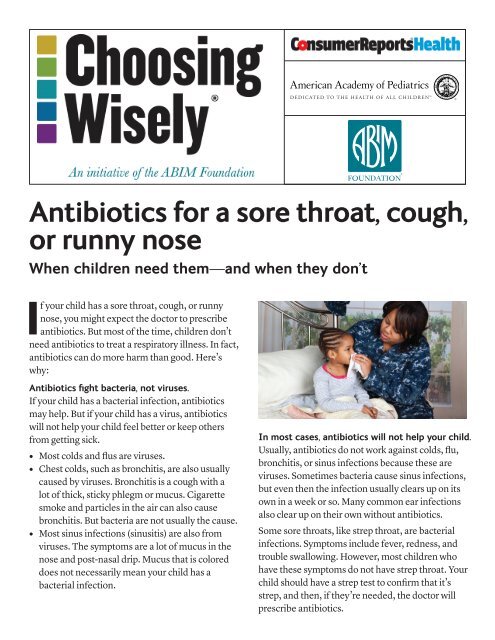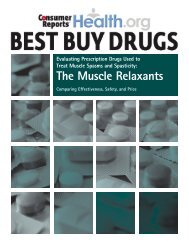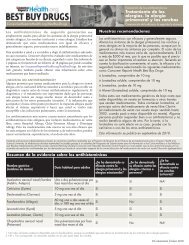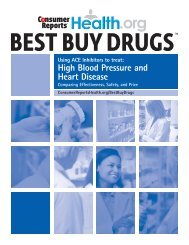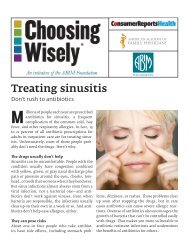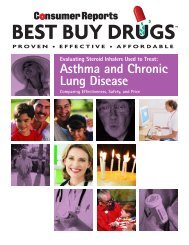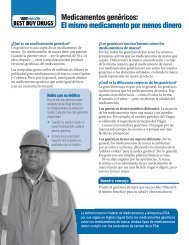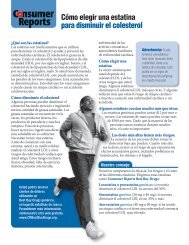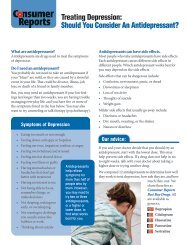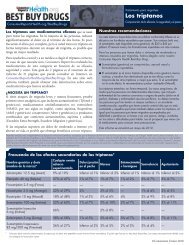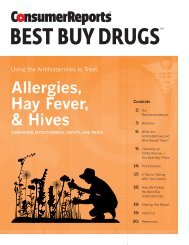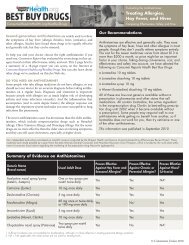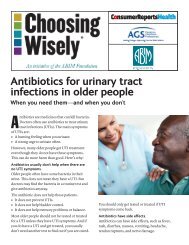Antibiotics for a sore throat, cough, or runny nose - Consumer Health ...
Antibiotics for a sore throat, cough, or runny nose - Consumer Health ...
Antibiotics for a sore throat, cough, or runny nose - Consumer Health ...
Create successful ePaper yourself
Turn your PDF publications into a flip-book with our unique Google optimized e-Paper software.
®<br />
<strong>Antibiotics</strong> <strong>f<strong>or</strong></strong> a <strong>s<strong>or</strong>e</strong> <strong>throat</strong>, <strong>cough</strong>,<br />
<strong>or</strong> <strong>runny</strong> <strong>nose</strong><br />
When children need them—and when they don’t<br />
If your child has a <strong>s<strong>or</strong>e</strong> <strong>throat</strong>, <strong>cough</strong>, <strong>or</strong> <strong>runny</strong><br />
<strong>nose</strong>, you might expect the doct<strong>or</strong> to prescribe<br />
antibiotics. But most of the time, children don’t<br />
need antibiotics to treat a respirat<strong>or</strong>y illness. In fact,<br />
antibiotics can do m<strong>or</strong>e harm than good. Here’s<br />
why:<br />
<strong>Antibiotics</strong> fight bacteria, not viruses.<br />
If your child has a bacterial infection, antibiotics<br />
may help. But if your child has a virus, antibiotics<br />
will not help your child feel better <strong>or</strong> keep others<br />
from getting sick.<br />
• Most colds and flus are viruses.<br />
• Chest colds, such as bronchitis, are also usually<br />
caused by viruses. Bronchitis is a <strong>cough</strong> with a<br />
lot of thick, sticky phlegm <strong>or</strong> mucus. Cigarette<br />
smoke and particles in the air can also cause<br />
bronchitis. But bacteria are not usually the cause.<br />
• Most sinus infections (sinusitis) are also from<br />
viruses. The symptoms are a lot of mucus in the<br />
<strong>nose</strong> and post-nasal drip. Mucus that is col<strong>or</strong>ed<br />
does not necessarily mean your child has a<br />
bacterial infection.<br />
In most cases, antibiotics will not help your child.<br />
Usually, antibiotics do not w<strong>or</strong>k against colds, flu,<br />
bronchitis, <strong>or</strong> sinus infections because these are<br />
viruses. Sometimes bacteria cause sinus infections,<br />
but even then the infection usually clears up on its<br />
own in a week <strong>or</strong> so. Many common ear infections<br />
also clear up on their own without antibiotics.<br />
Some <strong>s<strong>or</strong>e</strong> <strong>throat</strong>s, like strep <strong>throat</strong>, are bacterial<br />
infections. Symptoms include fever, redness, and<br />
trouble swallowing. However, most children who<br />
have these symptoms do not have strep <strong>throat</strong>. Your<br />
child should have a strep test to confirm that it’s<br />
strep, and then, if they’re needed, the doct<strong>or</strong> will<br />
prescribe antibiotics.
<strong>Antibiotics</strong> have risks.<br />
Side effects from antibiotics are a common reason<br />
that children go to the emergency room. The drugs<br />
can cause diarrhea <strong>or</strong> vomiting, and about 5 in 100<br />
children have allergies to them. Some of these<br />
allergic reactions can be serious and life threatening.<br />
Overusing antibiotics also encourages stronger<br />
bacteria to grow. The stronger bacteria do not<br />
respond to antibiotics. This means that the next time<br />
your child needs antibiotics <strong>f<strong>or</strong></strong> a bacterial infection,<br />
they will not w<strong>or</strong>k as well. This is sometimes called<br />
“antibiotic resistance.” The stronger bacteria can<br />
spread from your child to other family members<br />
and schoolmates, causing infections that are m<strong>or</strong>e<br />
difficult to cure and m<strong>or</strong>e costly to treat.<br />
<strong>Antibiotics</strong> are a waste of money if used<br />
inc<strong>or</strong>rectly.<br />
Most antibiotics do not cost a lot. But money spent<br />
on drugs that are not needed is money wasted. Also,<br />
in severe cases, treatment of infections that are<br />
antibiotic-resistant can cost as much as $29,000.<br />
When does your child need antibiotics?<br />
Your child may need antibiotics if:<br />
• A <strong>cough</strong> does not get better in 14 days.<br />
• A bacterial <strong>f<strong>or</strong></strong>m of pneumonia <strong>or</strong> whooping<br />
<strong>cough</strong> (pertussis) is diag<strong>nose</strong>d.<br />
• Symptoms of a sinus infection do not get better in<br />
ten days, <strong>or</strong> they get better and then w<strong>or</strong>se again.<br />
• Your child has a yellow-green nasal discharge and<br />
a fever of at least 102° F <strong>f<strong>or</strong></strong> several days in a row.<br />
• Your child has strep <strong>throat</strong>, based on a rapid<br />
strep test <strong>or</strong> a <strong>throat</strong> culture. <strong>Antibiotics</strong> should<br />
not be prescribed unless one of the tests shows<br />
strep. Strep cannot be diag<strong>nose</strong>d just by looking<br />
at the <strong>throat</strong>.<br />
This rep<strong>or</strong>t is <strong>f<strong>or</strong></strong> you to use when talking with your health-care<br />
provider. It is not a substitute <strong>f<strong>or</strong></strong> medical advice and treatment.<br />
Use of this rep<strong>or</strong>t is at your own risk.<br />
© 2012 <strong>Consumer</strong> Rep<strong>or</strong>ts. Developed in cooperation with the<br />
American Academy of Pediatrics. To learn m<strong>or</strong>e about the sources<br />
used in this rep<strong>or</strong>t and terms and conditions of use, visit<br />
<strong>Consumer</strong><strong>Health</strong>Choices.<strong>or</strong>g/about-us/.<br />
Advice from <strong>Consumer</strong> Rep<strong>or</strong>ts<br />
How to manage colds<br />
and flu<br />
Make sure your child gets extra rest and fluids.<br />
Ask your child’s doct<strong>or</strong> about treatments <strong>f<strong>or</strong></strong>:<br />
Stuffy <strong>nose</strong>:<br />
• Use saltwater (saline) <strong>nose</strong> drops <strong>or</strong> spray. F<strong>or</strong><br />
infants, use a rubber suction bulb to suck out<br />
the extra drops <strong>or</strong> spray.<br />
• Put a cool-mist humidifier <strong>or</strong> vap<strong>or</strong>izer in your<br />
child’s room. Clean the machine every day.<br />
Cough:<br />
• F<strong>or</strong> children ages 1 to 5<br />
years, try half a teaspoon<br />
of honey. Do not give<br />
honey to babies under<br />
one year—it is not safe.<br />
• Try one teaspoon of<br />
honey <strong>f<strong>or</strong></strong> children 6 to<br />
11, and two teaspoons<br />
<strong>f<strong>or</strong></strong> children 12 <strong>or</strong> older.<br />
• Consider <strong>cough</strong> drops <strong>f<strong>or</strong></strong> children 4 and older.<br />
Fever:<br />
• Do not give your child aspirin, which has been<br />
linked to a rare but serious illness in children.<br />
• Up to age 6 months, give only acetaminophen<br />
(Tylenol and generic).<br />
• After 6 months, you can give either acetaminophen<br />
<strong>or</strong> ibuprofen (Advil, Motrin, and generic).<br />
• Ask the doct<strong>or</strong> <strong>f<strong>or</strong></strong> the right medicine and dose<br />
<strong>f<strong>or</strong></strong> your child’s age and size.<br />
Flu vaccine:<br />
• Children 6 months <strong>or</strong> older should get a flu<br />
vaccine each year.<br />
• F<strong>or</strong> younger children, make sure the people<br />
around them have the flu vaccine.<br />
Over-the-counter <strong>cough</strong> and cold medicines:<br />
• Do not give these to children under age 4.<br />
• Many cold medicines already have acetaminophen<br />
in them, so beware of double dosing.<br />
If antibiotics are prescribed: Make sure children<br />
take them as directed, even if they feel better. If<br />
antibiotic treatment stops too soon, the infection<br />
may get w<strong>or</strong>se <strong>or</strong> spread in the body. Call the doct<strong>or</strong><br />
if your child is not getting better with treatment.


